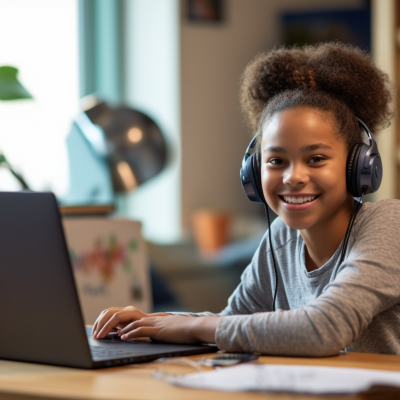In today’s digital age, online education has become a cornerstone of our learning ecosystem, especially in the elementary sector. Understanding the dynamics of teacher-student interaction within this framework is crucial for fostering an environment conducive to learning and development.
Inhalt
The Importance of Teacher-Student Interaction
Impact on Learning and Development
Teacher-student interaction is a critical factor in the educational journey of young learners. It significantly impacts their motivation, engagement, and understanding of the material. The relationship between teachers and students goes beyond the simple transmission of knowledge; it involves inspiring curiosity, fostering a love for learning, and nurturing critical thinking skills. In an online elementary school setting, the dynamics of these interactions are reshaped. The absence of physical presence demands innovative approaches to maintain and enhance the quality of these connections. Effective teacher-student interaction in the digital realm can lead to improved academic performance, better student satisfaction, and higher levels of emotional and social development. It empowers students to take an active role in their learning process, encouraging autonomy and responsibility.
Challenges in Online Interaction
Technologische Schranken
One of the primary challenges in online education is the technological barrier. Not all students have equal access to the necessary devices or reliable internet connections. This disparity can hinder their ability to participate in classes, access learning materials, and engage in interactive activities. Moreover, the proficiency of both teachers and students in using digital tools varies widely, potentially affecting the efficiency of online learning. Technical issues, such as software glitches and connectivity problems, can disrupt classes, leading to frustration and disengagement among students.
Emotional and Social Connection
The lack of physical presence in online classrooms can impact the emotional and social connections that are naturally built in a traditional setting. Non-verbal cues, such as body language and facial expressions, play a significant role in communication and are largely absent in virtual classrooms. This can make it challenging for teachers to gauge students’ understanding and emotional states. Additionally, students may feel isolated from their peers, missing out on the social interactions that contribute to their emotional development and the sense of belonging to a learning community.
Strategien für effektiven Online-Unterricht
Engaging Teaching Methods
To counteract the challenges of online interaction, teachers must adopt engaging teaching methods tailored to the virtual environment. This involves using a variety of multimedia resources, such as videos, interactive simulations, and digital games, to capture students’ attention and stimulate their interest. Storytelling, virtual field trips, and project-based learning can also enrich the online learning experience, making it more interactive and enjoyable. Encouraging participation through discussion forums, breakout rooms, and interactive polls can foster a sense of community and collaboration among students.
Use of Technology
Effectively leveraging technology is key to enhancing teacher-student interaction in online classrooms. Educational platforms and tools, such as learning management systems (LMS), video conferencing software, and digital whiteboards, can facilitate seamless communication and collaboration. Integrating these technologies requires thoughtful planning and training for both teachers and students to ensure they are used to their full potential. For example, teachers can utilize LMS features to track student progress, provide personalized feedback, and adapt teaching strategies to meet individual learning needs. Moreover, adopting adaptive learning technologies can help create a more personalized learning experience, adjusting the content and pace according to each student’s performance and preferences.
Building a Supportive Online Learning Environment
Creating a supportive online learning environment is essential for fostering effective teacher-student interactions and ensuring student success. This environment encompasses not just the academic aspects of learning but also the emotional and social support systems that contribute to a holistic educational experience.
Communication Channels
Open and effective communication channels are the foundation of a supportive online learning environment. Teachers should utilize a variety of platforms to facilitate clear, consistent, and accessible communication. Email, learning management systems, video conferencing tools, and educational apps can all play a role in keeping the lines of communication open between teachers, students, and parents. These tools not only support the dissemination of instructional content but also enable real-time feedback, queries, and discussions, making the learning experience more interactive and engaging.
Ermutigung zur Teilnahme
Encouraging participation in an online setting requires creative strategies to engage students actively. Gamification elements, like badges and leaderboards, can motivate students to participate more fully in their learning. Live polls, quizzes, and interactive discussions encourage students to share their thoughts and contribute to the learning community. Personalizing learning activities to reflect students’ interests and providing choices in how they learn and demonstrate their understanding can also boost participation and engagement.
The Role of Feedback in Online Learning
Feedback is a vital element of the learning process, providing students with insights into their performance and guidance on how to improve. In an online environment, the role of feedback becomes even more crucial due to the physical separation between teachers and students.
Types of Feedback
Feedback in online learning can take many forms, from written comments and grades to audio feedback and video responses. Immediate, automated feedback on quizzes and interactive exercises can provide quick reinforcement of learning concepts, while personalized feedback on assignments and projects offers detailed guidance and support. Peer feedback is another valuable component, fostering a collaborative learning environment where students can learn from one another.
Importance of Timely and Constructive Feedback
Timely and constructive feedback is essential for keeping students engaged and motivated. It helps students understand their strengths and areas for improvement, encouraging a growth mindset. Constructive feedback should be specific, actionable, and focused on the task rather than the individual, providing clear guidance on how to improve. Timeliness ensures that students can apply this feedback effectively to their subsequent work, reinforcing learning and facilitating improvement.
Parental Involvement in Online Learning
The shift to online learning has highlighted the critical role of parental involvement in children’s education. Parents are not just facilitators of their child’s learning environment at home but also key partners in the educational process.
Supporting Learning at Home
Parents can support their children’s online learning by creating a structured and conducive learning environment at home. This includes setting up a quiet and comfortable study space, establishing a routine, and ensuring that children have the necessary resources and technology. Encouraging regular breaks, physical activity, and time away from screens is also important for maintaining balance and well-being.
Communication with Teachers
Effective communication between parents and teachers is paramount in online learning. Regular updates, virtual parent-teacher conferences, and open lines of communication can help parents stay informed about their child’s progress, upcoming assignments, and any challenges they may be facing. Teachers can also provide parents with guidance on how to support their child’s learning at home, reinforcing the partnership between home and school.
Schlussfolgerung
Building a supportive online learning environment is a multifaceted endeavor that requires attention to communication, participation, feedback, and parental involvement. By addressing these elements, educators can create a virtual classroom that not only meets academic needs but also supports the emotional and social well-being of students. As online learning continues to evolve, fostering these supportive environments will be crucial for delivering high-quality education that prepares students for success both in and out of the classroom.









